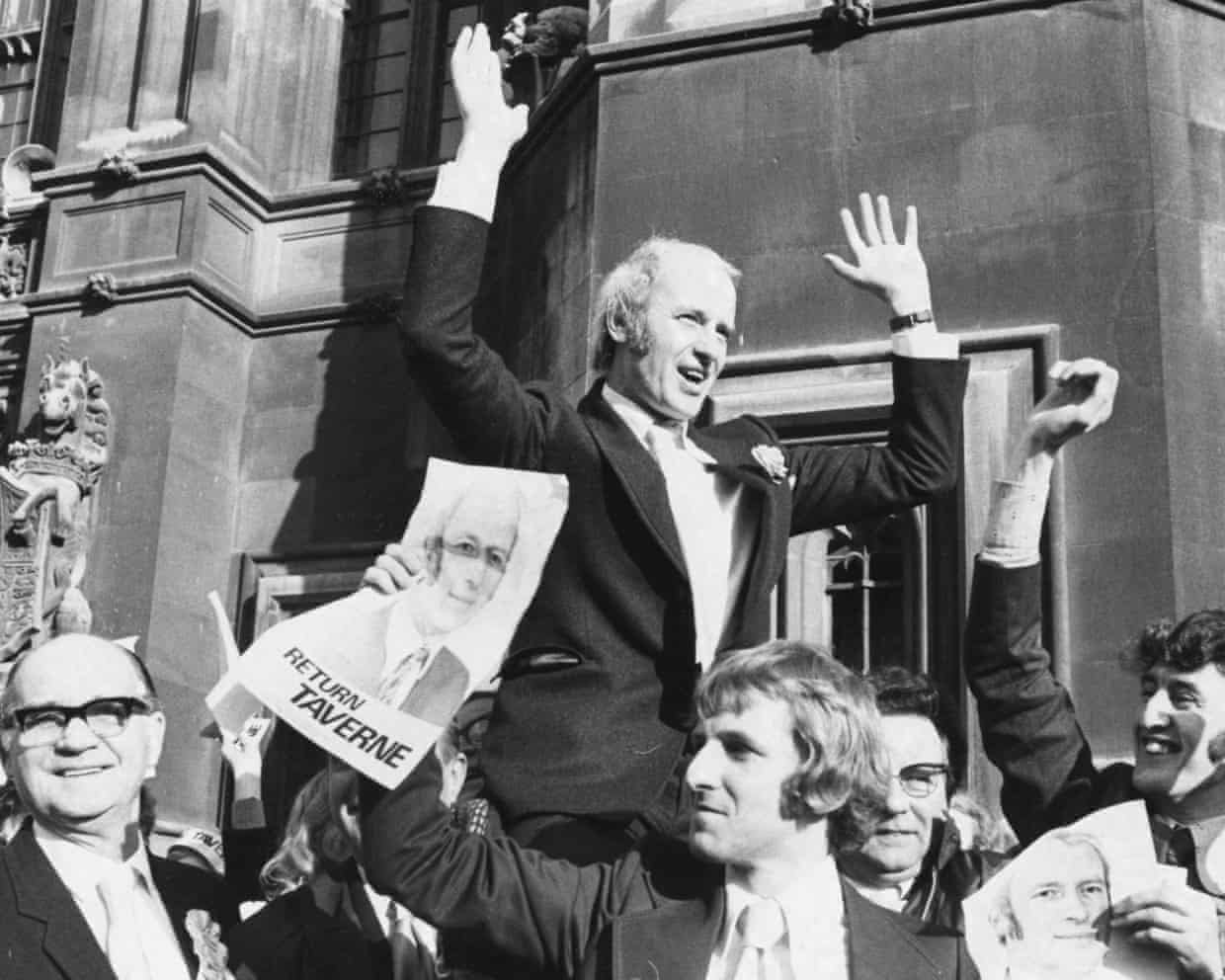Lord Taverne obituary

Dick Taverne’s brief moment of political fame – or notoriety – came in 1973 when he beat Labour, the party for which he had been an MP, in a byelection in his own Lincoln constituency.It served as a precursor of the Labour party’s internecine 1980s strife and an early indication of the divisions that Europe has continued to cause in British political life.Taverne, who has died aged 97, fell out spectacularly with a leftwing faction of the local party in Lincoln, where he had been the Labour MP for a decade, over his support for Britain’s entry into the Common Market.He was deselected, but instead of quietly serving out his term he resigned, stood as a Democratic Labour candidate and won a spectacular byelection victory despite a heavyweight campaign by the national leadership to defeat him.The day after his victory, the Guardian wrote hyperbolically: “Nothing quite like it has been seen this century in British elections.
Mr Taverne must earn the title of Dick the Giant Killer,” He told the electorate that they had made history: “You, the people of Lincoln, have shown that what matters in politics is more than playing it the way the parties tell you,”Taverne held on to the seat at the first of the following year’s general elections but lost it in the second, never again to serve as an MP, though he stood twice more unsuccessfully for the Social Democratic party in London, before being created a Liberal Democrat peer in 1996,Dick was a Dutch national by birth, the second of four children, having been born in the jungle of Sumatra, where his deeply conservative father Nicolaas was working as a geologist for Royal Dutch Shell,His mother, Louise, was Anglo-Dutch, and he was not naturalised as British until the age of 21.
In August 1939 the family moved to London after his father was transferred to the British arm of the company to protect its Dutch interests in case the Netherlands was overrun by the Germans,Fortunately their departure from what was then the Dutch East Indies came before the Japanese invasion of the region,Taverne went to Charterhouse school, in Godalming, Surrey, where he was a near-contemporary of the future Times editor William Rees-Mogg, and won a scholarship to Balliol College, Oxford, where he studied classics and obtained a first-class degree,At university he was active in the Oxford Union debating society – he was beaten to the presidency by Jeremy Thorpe – and in 1951 took part in a debating tour of American campuses with Thorpe, Rees-Mogg and the future broadcaster Robin Day,From school days, Taverne had been a Labour supporter (one of only four, he reckoned, at his conservative and conformist school), and at Oxford he chaired the Labour club, soon spotted as a potential future candidate for the Gaitskellite wing of the party.
After university he studied for the bar, working as a nightwatchman in an Oxford Street store and teaching part-time at Mill Hill school while he studied.He was approached by Bill Rodgers, one of the future founders of the SDP, at that time assistant secretary of the Fabian Society, and asked whether he would be interested in standing for Putney in the 1959 general election.He did so, and lost, but afterwards publicly supported the party leader Hugh Gaitskell’s attempt to abolish the pro-nationalisation clause four from the party’s constitution and, as treasurer of the pressure group Campaign for Democratic Socialism, backed Gaitskell’s fight against the left wing’s support for unilateral nuclear disarmament.As a rising figure on the right of the party, handsome and personable on TV, though with more than a hint of condescension, he was hand-picked by Gaitskell to fight a byelection in Lincoln in 1962 to succeed Geoffrey de Freitas, the sitting Labour MP, after he resigned to become high commissioner in Ghana, winning the seat and retaining it through the Harold Wilson years of the 1960s.The Labour party in Lincoln was deeply divided, with a leftwing faction of trade unionists from local engineering factories who were increasingly critical of the MP.
Taverne wrote later that they attacked him as “middle class, legalistic and academic”,He served as a junior Home Office minister (1966-68) and Treasury minister,When he became financial secretary to the Treasury in 1969, he had to fend off demands that he should resign over the introduction of NHS prescription charges,The attacks became increasingly personal – “We don’t want a cabbage,” claimed Leo Beckett, a foreman and shop steward at the local GEC works and leading member of the party management committee,The crunch came in 1971 when Roy Jenkins led 67 other Labour MPs, including Taverne, in defying the party line by voting in favour of legislation to lead Britain into the Common Market, following the victory of Ted Heath’s Conservatives in the 1970 election.
Taverne declined friends’ suggestion that he should abstain to maintain the peace in his local party, writing later in the Observer: “When the future of one’s country is at stake one doesn’t sit on the fence,”The Lincoln management committee voted to deselect him and the party’s national executive committee backed the decision, supported by Tony Benn, who Taverne had previously regarded as a friend since representing him during his court fight to resign his peerage a decade earlier,The left argued that an MP should accept their majority decision on policy matters, Taverne that he was a representative, not a delegate, and had never made a secret of his pro-European views,In the Observer article he noted wryly that the left had always been foremost in proclaiming the right to dissent,“If I ran into trouble for sticking to what was previously party policy I could not really imagine the NEC remaining totally indifferent to the damage this could do to the party’s reputation for tolerance,” he wrote later.
Taverne was duly deselected, but instead of accepting the decision he resigned the seat and fought as an independent.After a divisive and bitter campaign – which deteriorated into violence at the count – he secured nearly 60% of the vote and trebled his previous majority to more than 13,000.At the February 1974 general election exactly a year later he clung on as it sank to 1,293.But that October he was defeated by a similar margin by Labour’s Margaret Jackson – later to marry Beckett and eventually become foreign secretary and Labour’s deputy leader, but not before she herself had lost the seat at the 1979 election to the Conservatives, who held it for the next 18 years.Taverne had helped to set up the Institute for Fiscal Studies in 1970 and served as its first director, then later director general and eventually chairman, as well as chairman of the Public Policy Centre, another think tank.
When the SDP was founded in 1981 he joined its national committee, coming second to Harriet Harman in the Peckham byelection in 1982 and third in neighbouring Dulwich in 1983.As the party folded he joined the Liberal Democrats in 1987, as did Jenkins, and sat in the Lords from 1996.Taverne became increasingly interested in science, founding the pressure group Sense About Science in 2002, aimed at improving public education in the subject.His book The March of Unreason won him the Science Writers’ award as parliamentary communicator of the year in 2005.He was also a prominent supporter of the National Secular Society and the British Humanist Association.
He published a memoir, Against The Tide, in 2014.In 1955 Taverne married Janice Hennessey, a microbiologist whom he had met when she was researching tropical diseases at Oxford.She survives him, along with their two daughters, Suzanna and Caroline.Dick Taverne, Lord Taverne, politician, born 18 October 1928; died 25 October 2025

US debt set to soar above Italy and Greece after Trump’s ‘big, beautiful bill’
Donald Trump is on course to push US debt levels above those of Italy and Greece by the end of the decade after wide-ranging tax cuts and increased defence spending, according to International Monetary Fund (IMF) forecasts.Illustrating the rising debt levels in Washington and efforts made by Rome and Athens to bring spending under control after the 2008 financial crash and Covid-19 pandemic, the IMF predicts the US will see its debts climb from 125% to 143% of annual income by 2030, while Italy’s will flatline at about 137%.Greece is on track to cut the ratio of debt to gross domestic product (GDP) from 146% to 130% over the same period. According to IMF data, Athens has tackled a budget overspend that raced to 210% as a proportion of GDP in 2020.Amid tax cuts for high earners, the US is expected to run annual budget deficits of more than 7% over the next five years, while Italy is due to cut its spending shortfall this year to 2

Oil and gas firm Petrofac files for administration, putting thousands of jobs at risk
Petrofac, one of the biggest North Sea oil and gas contractors, has filed for administration, putting more than 2,000 jobs in Scotland at risk.The energy services provider said it had applied to the high court of England and Wales to appoint administrators, after it lost a major offshore wind project over its failure to meet contractual obligations.Petrofac, which employs about 7,300 people globally, said the administration plans – likely to be carried out by the business services firm Teneo – applied only to its ultimate holding company and that it would continue to trade during the process.Nevertheless, any uncertainty over the company’s continued viability could add to political pressure on the UK government, as it faces a backlash over plans to tackle the climate crisis by blocking new North Sea oil licences for exploration.Energy secretary Ed Miliband’s department said on Monday it was leading efforts across “all parts of government” to support Petrofac’s UK arm, which it employs about 2,000 people at its North Sea hub in Aberdeen

‘People thought I was a communist doing this as a non-profit’: is Wikipedia’s Jimmy Wales the last decent tech baron?
In an online landscape characterised by doom and division, the people’s encyclopedia stands out – a huge collective endeavour giving everyone free access to the sum of human knowledge. But with Elon Musk branding it ‘Wokipedia’ and AI looming large, can it survive?Wikipedia will be 25 years old in January. Jimmy Wales’s daughter will be 25 and three weeks. It’s not a coincidence: on Boxing Day 2000 Wales’s then wife, Christine, gave birth to a baby girl, but it quickly became clear that something wasn’t right. She had breathed in contaminated amniotic fluid, resulting in a life-threatening condition called meconium aspiration syndrome

US and China reach ‘final deal’ on TikTok sale, treasury secretary says
The US treasury secretary, Scott Bessent, claimed on Sunday that the US and China have finalized the details of a deal transferring TikTok’s US version to new owners.“We reached a final deal on TikTok,” Bessent said on Sunday on CBS’s Face the Nation with Margaret Brennan. Alluding to Donald Trump and his Chinese counterpart, Xi Jinping, Bessent continued: “We reached [a deal] in Madrid, and I believe that as of today, all the details are ironed out, and that will be for the two leaders to consummate that transaction” during a meeting scheduled for Thursday in Korea.Bessent did not disclose any details of the deal. But he did say it was a part of a broader framework – agreed to by both the US and China – of a potential trade deal to be discussed when Trump and Xi meet in the coming days

‘I’m making it work’: Lando Norris confident he is finally getting to grips with his McLaren
Lando Norris has said he is finally confident handling his McLaren car after a dominant victory at the Mexico City Grand Prix that moved him to the top of the world championship standings with four races remaining.The British driver won at the Autódromo Hermanos Rodríguez with a superb drive from pole to flag. With his McLaren teammate Oscar Piastri finishing only fifth and Red Bull’s Max Verstappen in third, the Briton now leads Piastri by one point and Verstappen by 36. Piastri had held the title lead since the Saudi Arabian Grand Prix but Norris has moved to the front as the championship enters its final run-in.He has struggled for much of the season, particularly in qualifying, not enjoying the feel of the grip from the front axle as much as he would like while Piastri enjoyed a strong run of results

England look to dodge lightning strike after familiar crumble in opening ODI
At the time and taken in isolation England’s opening ODI against New Zealand on Sunday seemed wild, chaotic, bizarre. As they batted at the start of the game wickets fell to the first ball, the ninth, the 12th, and – except for the period when the brilliant Harry Brook was joined at the crease by Jamie Overton – fairly regularly thereafter. Beyond that pair, the rest of the team scored 25.But to anyone who witnessed the start of their last series in the format, against South Africa at Headingley last month – when they lost the toss, were put in to bat and rolled for 131 – it was a very familiar kind of freakishness. Indeed in 12 bilateral ODI series since their 2022 T20 World Cup win they have won the first game twice and lost it nine times (one was abandoned) – and in all but one of those defeats they batted first and posted a score that was easily chased down, losing by six wickets, eight wickets, four, seven, eight, four, seven and most recently four

My cultural awakening: A Jim Carrey series made me embrace baldness – and shave my head on the spot

From Springsteen: Deliver Me from Nowhere to IT: Welcome to Derry – your complete entertainment guide to the week ahead

John Deere obituary

Timely assurance from Lear’s Kent | Letters

The Guide #214: Sleep-inducing songs and tranquilising TV – the culture that sends us to sleep (in a good way)

Seth Meyers on Trump’s White House ballroom: ‘This couldn’t be any more of a bait and switch’